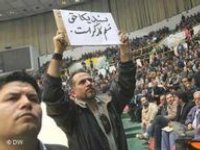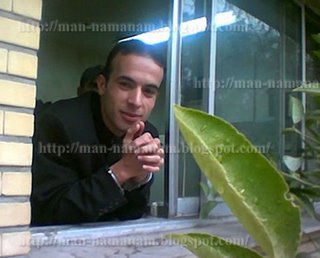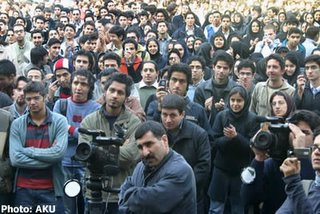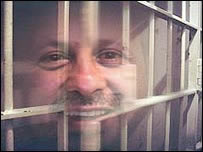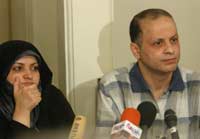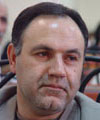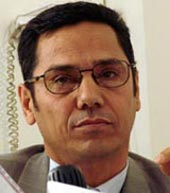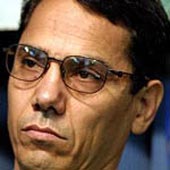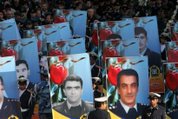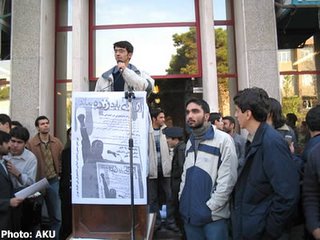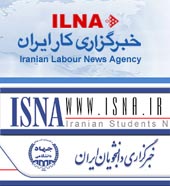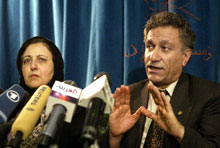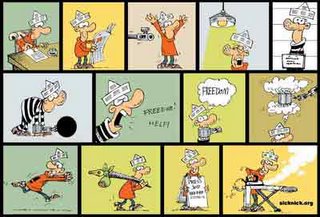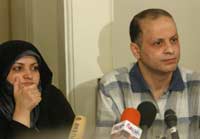
Iran
Respect for basic human rights in Iran, especially freedom of expression and opinion, deteriorated considerably in 2005. The government routinely uses torture and ill-treatment in detention, including prolonged solitary confinement, to punish dissidents. The judiciary, which is accountable to Supreme Leader Ali Khamenei, has been at the center of many serious human rights violations. Abuses are perpetrated by what Iranians call “parallel institutions”: paramilitary groups and plainclothes intelligence agents violently attack peaceful protesters, and intelligence services run illegal secret prisons and interrogation centers. President Mahmoud Ahmadinejad, elected in June 2005, appointed a cabinet dominated by former members of the intelligence and security forces, some of whom are allegedly implicated in the most serious human rights violations since the Islamic Republic of Iran was established twenty-six years ago, such as the assassination of dissident intellectuals.
Printer Friendly VersionAlso Available in
Related Material
More Information on Human Rights in IranCountry Page
Country Summary - PDFWorld Report Chapter
World Report 2006 Report, January 18, 2006
Free Email NewsletterContribute to Human Rights WatchFreedom of Expression and Opinion :
The Iranian authorities have systematically suppressed freedom of expression and opinion since April 2000, when the government launched a campaign involving closure of newspapers and the imprisonment of journalists and editors. Consequently, very few independent dailies remain, and those that do self-censor heavily. Many writers and intellectuals have left the country, are in prison, or have ceased to be critical. During 2005 the authorities also targeted websites and Internet journalists in an effort to prevent online dissemination of news and information. Between September and November of 2004, the judiciary detained and tortured more than twenty bloggers and Internet journalists, and subjected them to lengthy solitary confinement. The government systematically blocks websites with political news and analysis from inside Iran and abroad. On February 2, 2005, a court in the province of Gilan sentenced Arash Sigarchi to fourteen years in prison for his online writings. In August 2005, the judiciary sentenced another blogger, Mojtaba Saminejad, to two years in prison for “insulting” Iran’s leaders. Torture and Ill-treatment in Detention With the closure of independent newspapers and journals and the suppression of reporting on human rights abuses, treatment of detainees has worsened in Evin prison as well as in detention centers operated clandestinely by the judiciary and the Islamic Revolutionary Guard Corps. The authorities have subjected those imprisoned for peaceful expression of their political views to torture and ill-treatment. Judges often accept coerced confessions. The authorities use prolonged solitary confinement, often in small basement cells, to coerce confessions (which are videotaped) and gain information regarding associates. Combined with denial of access to counsel, prolonged solitary confinement creates an environment in which prisoners have nowhere to turn to seek redress for their treatment in detention. The judiciary issued an internal report in July 2005 admitting serious human rights violations, including widespread use of torture, illegal detentions, and coercive interrogation techniques. However, the judiciary failed to establish any safeguards, follow up on its findings, or hold any officials responsible. Impunity There is no mechanism for monitoring and investigating human rights violations perpetrated by agents of the government. The closure of independent media in Iran has helped to perpetuate an atmosphere of impunity. In recent years, public testimonies by numerous former prisoners and detainees have implicated Tehran’s public prosecutor Saeed Mortazavi and his office in some of the worst cases of human rights violations. Despite extensive evidence, Mortazavi has not been held responsible for his role in illegal detentions, torture of detainees, and coercing false confessions.
The case of Iranian-Canadian photojournalist Zahra Kazemi, who died in the custody of judiciary and security agents led by Mortazavi in June 2003, remains unresolved. Lawyers representing Kazemi’s family revealed that in addition to signs of torture including fractures to her nose, fingers, and toes, Kazemi received heavy blows to her head, once during her initial detention by the head of the intelligence unit at Evin prison on June 23, 2003, and another blow during an interrogation led by Mortazavi three days later. According to autopsy reports, Kazemi died of severe blows to her head. The judiciary had accused a low-ranking Intelligence Ministry official, Reza Ahmadi, of Kazemi’s unintentional homicide, and had proceeded with a hastily organized trial held in May 2004 which cleared Reza Ahmadi of the charges. Following an appeal by lawyers representing Kazemi’s family, an appeal hearing was convened in July 2005, in which the lawyers demanded that the judiciary launch an investigation into charges of intentional homicide, but the judge refused their request. The judiciary has taken no further steps to identify or prosecute those responsible for Kazemi’s killing.
Human Rights Defenders In 2005, the authorities intensified their harassment of independent human rights defenders and lawyers in an attempt to prevent them from publicizing and pursuing human rights violations. The judiciary summoned Noble Peace Prize winner Shirin Ebadi in January 2005 without specifying charges against her. After she challenged her summons as illegal, and following an international outcry, the judiciary rescinded its order. In July, the authorities once again threatened to arrest Ebadi after she publicized several high-profile human rights cases. On July 30, the judiciary detained Abdolfattah Soltani, a lawyer and member of the Center for Defense of Human Rights, after Soltani and Ebadi protested the judiciary’s inaction in Zahra Kazemi’s case. No formal charges have been filed against Soltani; the judiciary appears to be using his illegal detention as a way to intimidate and silence other human rights defenders and lawyers. Prominent dissident and investigative journalist Akbar Ganji, who exposed the role of high-ranking officials in the murders of writers and intellectuals in 1998, remained imprisoned for a sixth year.
Minorities Iran’s ethnic and religious minorities are subject to discrimination and, in some cases, persecution. The Baha’i community continues to be denied permission to worship or engage in communal affairs in a public manner. In April 2005, protests erupted in the southern province of Khuzistan, home to nearly two million Iranians of Arab descent, following publication of a letter allegedly written by Mohammad Ali Abtahi, an advisor to then-President Mohammad Khatami, which referred to government plans to implement policies that would reduce the proportion of ethnic Arabs in Khuzistan’s population. After security forces opened fire to disperse demonstrators in Ahvaz, the confrontation turned violent and spread to other cities and towns in Khuzistan. The next day, Abtahi and other government officials called the letter a fake. During the clashes, security forces killed at least fifty protestors and detained hundreds more.
In July 2005, security forces shot and killed a Kurdish activist, Shivan Qaderi, in Mahabad. In the wake of this incident protests were held in several cities and towns in Kurdistan demanding that the government apprehend Qaderi’s killers and put them on trial. Government forces put down the protests, killing at least seventeen people and detaining several prominent Kurdish journalists and activists. In October 2005, they were released on bail. Key International Actors In 2005 the policy of the European Union towards Iran was dominated by negotiations over Iran’s nuclear programs, with human rights concerns a secondary matter. The European Union has pledged to tie Iranian respect for human rights to progress in co-operation on other issues, but so far with little impact. Australia and Switzerland also have “human rights dialogues” with Iran but have not made public any relevant benchmarks for assessing progress. Against strenuous Iranian objections, the United Nations General Assembly adopted a resolution in November 2004, noting serious violations and the worsening of the human rights situation in Iran. However, in 2005, unlike in previous years, no resolution was introduced at the U.N. Commission on Human Rights concerning the human rights situation in Iran. Under a standing invitation issued in 2002 from Tehran to the thematic mechanisms of the U.N. Commission on Human Rights, the Working Group on Arbitrary Detention and the special rapporteur on the promotion and protection of the right to freedom of opinion and expression visited the country and subsequently issued reports critical of government practices. However, the government has failed to implement their recommendations, and in some cases there were reprisals, such as re-arrest, against persons who testified to the experts. In January 2005 the special rapporteur on violence against women visited Iran, and the special rapporteur on adequate housing made a visit in August. Iran has not responded to requests by the U.N. special rapporteurs on torture and on extrajudicial executions to visit the country. Relations between the United States and Iran remain poor. President Bush in August 2005 said that U.S. military action against Iran was an “option on the table,” but the administration reportedly remains divided on this point.
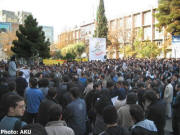

 |
|



